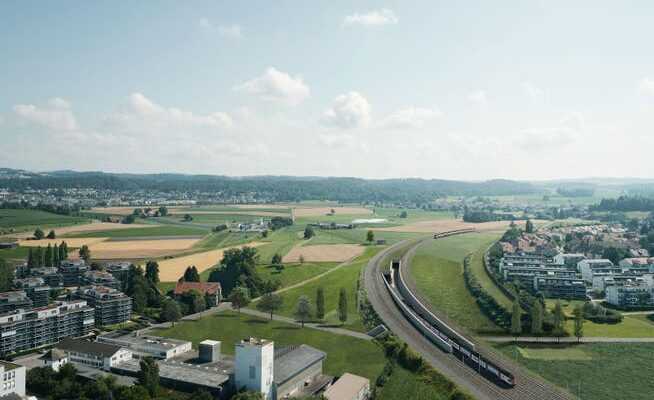The expansion of the Zurich–Winterthur railway line eats up thousands of square meters of agricultural land. Intensive negotiations are now underway.
Between Dietlikon and Bassersdorf (back left), the expansion on the Zurich–Winterthur route requires a lot of cultivated land.
When traffic planners look at the last free fields between Bassersdorf, Dietlikon and Wangen-Brüttisellen, they see one thing above all: potential. Potential for road expansion, potential for railway expansion.
Both are urgently needed. The section of the A1 there is the busiest stretch of motorway in Switzerland, and the railway line is one of the most important routes in the Swiss railway network. They are already reaching their limits today.
However, the expansion of the road, the major project of the Glatttal autobahn, is still many decades away. The Federal Roads Office speaks of commissioning in 2061 at the earliest.
The plans for rail, on the other hand, have progressed much further: the federal government already agreed to finance the expansion in 2019. Around a year before the CHF 2.4 billion project is publicly launched, the SBB and the Zurich Transport Association (ZVV) provided information on the status of the work on Friday.
Around 670 trains with 120,000 passengers use the route between Zurich and Winterthur every day. By 2035, it is to be expanded to around 900 trains and 156,000 passengers a day. In addition, the travel time would be reduced by up to 8 minutes.
This is made possible thanks to a new bypass: the 9 km long Brütten tunnel connects Bassersdorf and Dietlikon directly with Winterthur. The trains travel in the two tubes at 160 kilometers per hour. “Today there are up to 18 trains per hour in each direction between Zurich and Winterthur,” said Dominik Brühwiler, director of the ZVV. In the future it would be 26. So practically a two-minute cycle.
Although the project is intended to be implemented as environmentally friendly as possible, the work will have a negative impact on the surrounding area. The construction period is ten years, and work often has to be done at night for traffic reasons. A separate loading station will be built for the excavation from the tunnel, around 4 million tons of material, said Bruno Studer, the overall project manager at SBB.
At information events in the communities affected, he perceived a good basic attitude, Studer continued. He also heard critical voices and had intensive discussions with farmers.
Goal: an agreement by the end of the year
IG Eich is one of the most important representatives of agriculture. It brings together 12 active farmers, 2 gardeners and all tenants in the area between Bassersdorf, Dietlikon and Wangen-Brüttisellen. “We cannot prevent the project,” says Kurt Schmid, President of IG Eich. «It will come. But we’re trying to optimize it so that it’s right for both sides.”
The Brütten tunnel alone will cost around 50,000 to 60,000 square meters of cultivated land, he says. Even about 250,000 square meters would be occupied by the installation space during ten years. This roughly corresponds to the size of an average farm.
Schmid emphasizes that it is not about preventing the project. Farmers’ problems must be taken seriously. “We are fighting to ensure that productive agriculture with large areas and good soil is possible during construction and afterwards,” he says.
Sometimes it’s about small things. A new bike path that no longer runs across the fields, but next to the SBB route. Better noise protection or better dust protection.
Her goal is to reach an agreement with the SBB by the end of the year, in which all central points are settled. “If we can achieve that, we will not file an objection to the project.” Bruno Studer from SBB also says that his major goal is an amicable agreement.
However, it will still be a while before the trains between Zurich and Winterthur disappear underground, even without delays and objections. The SBB schedule expects construction to start in 2026. Commissioning is then scheduled for the end of 2034.
Railway expansion 2035
zge. Switzerland wants to expand the railway throughout the country by 2035. The federal government has spoken for around 12.9 billion Swiss francs. A good part of it flows into the greater Zurich area. The expansion of the route between Zurich and Winterthur for 2.4 billion Swiss francs is the largest project. Further expansion steps in the region are the Zimmerberg Base Tunnel 2 for better connections to Zug (CHF 1.4 billion) and an expansion of capacities between Stadelhofen, the Zurich Oberland and the right bank of Lake Zurich (CHF 1.2 billion).
